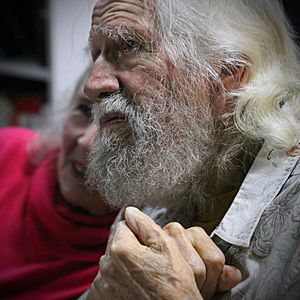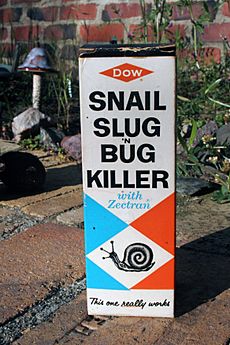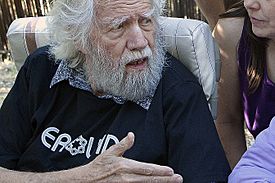Alexander Shulgin facts for kids
Quick facts for kids
Alexander Shulgin
|
|
|---|---|

Shulgin (right) with his wife Ann in 2011
|
|
| Born |
Alexander Theodore Shulgin
June 17, 1925 Berkeley, California, U.S.
|
| Died | June 2, 2014 (aged 88) Lafayette, California, U.S.
|
| Alma mater | |
| Known for |
|
| Spouse(s) | Nina Gordon (deceased) Ann Gotlieb (deceased) |
| Children | 1 |
| Scientific career | |
| Fields | Chemistry, psychology, philosophy, biology |
| Institutions |
|
Alexander Theodore "Sasha" Shulgin (June 17, 1925 – June 2, 2014) was an American medicinal chemist, biochemist, organic chemist, pharmacologist, psychopharmacologist, and author.
In 1991 and 1997, he and his wife Ann Shulgin compiled the books PiHKAL and TiHKAL (standing for Phenethylamines and Tryptamines I Have Known And Loved), from notebooks that extensively described their work and personal experiences with these two classes of drugs. Shulgin performed seminal work into the descriptive synthesis of many of these compounds. Some of Shulgin's noteworthy discoveries include compounds of the 2C* family (such as 2C-B) and compounds of the DOx family (such as DOM).
Life and career
Shulgin was born in Berkeley, California, to Theodore Stevens Shulgin (1893–1978) and Henrietta D. (Aten) Shulgin (1894–1960). His father was born in Chelyabinsk, Russia; his mother was born in Illinois. Theodore and Henrietta were public school teachers in Alameda County.
Shulgin began studying organic chemistry as a Harvard University scholarship student at the age of 16. In 1943 he dropped out of school to join the U.S. Navy. While serving on USS Pope during World War II, a nurse gave Shulgin a glass of orange juice prior to surgery for a thumb infection. Shulgin drank the juice and, assuming that the powder at the bottom of the glass was a sedative, fell asleep rapidly. Upon waking he learned that the powder was undissolved sugar. The experience made him aware of the influence of placebos over the human mind.
After serving in the Navy, Shulgin returned to Berkeley, California, and in 1954 earned his PhD in biochemistry from the University of California, Berkeley. Through the late 1950s Shulgin completed post-doctoral work in the fields of psychiatry and pharmacology at University of California, San Francisco. After working at Bio-Rad Laboratories as a research director for a brief period, he began work at Dow Chemical Company as a senior research chemist. One of his early achievements at Dow was the invention of the first known biodegradable pesticide (mexacarbate).
Shulgin's professional activities continued to lean in the direction of psychopharmacology. But during this period he was unable to do much independent research. His opportunity for further research came in 1961 after his development of Zectran, the first biodegradable pesticide, a highly profitable product. In his book PiHKAL, Shulgin limits his pesticide days at Dow Chemical to one sentence in 978 pages. Dow Chemical Company, in return for Zectran's valuable patent, gave Shulgin great freedom. During this time, he created and patented drugs when Dow asked, and published findings on other drugs in journals such as Nature and the Journal of Organic Chemistry. Eventually, Dow Chemical requested that he no longer use their name on his publications.
In late 1966, Shulgin left Dow in order to pursue his own interests. He first spent two years studying neurology at the University of California, San Francisco School of Medicine, leaving to work on a consulting project. He set up a home-based lab on his property, known as "the Farm", and became a private consultant. He also taught classes in the local universities and at the San Francisco General Hospital.
Personal life, health, and death
Shulgin was married to Nina Gordon until her death. He then married author Ann Gotlieb. He spent most of his later life at the Farm in Lafayette, California.
On April 8, 2008, at the age of 82, he underwent surgery to replace a defective aortic valve. On November 16, 2010, he suffered a stroke, from which he largely recovered. Around this time, Shulgin began showing early signs of dementia, mostly severe loss of short-term memory. With progression of the dementia since 2010, his wife, Ann Shulgin, had been trying to sell part of their property to raise more money to cover care costs.
On April 17, 2014, Ann Shulgin reported on Facebook that her husband had developed liver cancer. Shulgin died at his home on June 2, 2014, at the age of 88.
Societies
Shulgin was a member of Mensa International and frequently attended Mensa events in California.
Alexander was a Bohemian Club member. The Bohemian club is located in California where Alexander lived. Alexander refers to "The Owl Club" in chapter 11 of PiHKAL:
One evening in the late 1950s, I was invited to a musical soiree at an old comfortable home in the Berkeley Hills. I brought my viola with me... The only person I can remember from that evening was a handsome, proper gentleman with a small grey moustache and the residues of an English accent. During coffee, after the music was over, he struck up a conversation.
He asked me if I had ever heard of The Owl Club in San Francisco? I had not, so he began painting a picture of a rather fascinating group, with many interests in all sorts of art, drama and music. He mentioned that there was need for a viola player, and would I be interested in sitting in for a couple of evenings? ... The Club proved to be a group of gentlemen from a broad array of political and professional backgrounds, leaning somewhat toward the political right and the well-to-do. ... At my first evening at the Club... Andrew was appointed my Pater Familias ..."
– PiHKAL, First Printing, Eleventh Edition, Chapter 11, pp. 60–65
See also
 In Spanish: Alexander Shulgin para niños
In Spanish: Alexander Shulgin para niños



